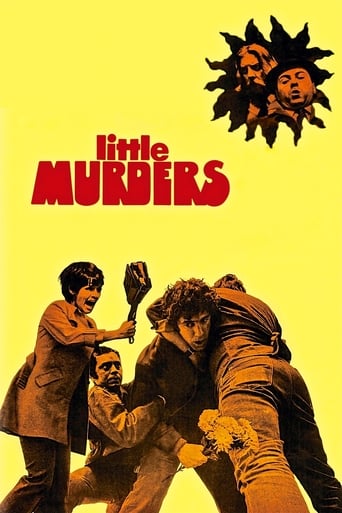MisterWhiplash
Man, 1971 sure was a violent year in movies, wasn't it? Perhaps it was a very accurate depiction of the period - I wasn't alive then, so I can only surmise from reading books or asking relatives or seeing the movies - and look at the bunch that were out that year: Straw Dogs, Dirty Harry, A Clockwork Orange, The Devils, Punishment Park, even Duel or Play Misty for Me. And in the midst of all of this is one of those "sleeper" films, directed by Alan Arkin (would be direct again, who knows, but this was his shot and he took it), scripted by Julies Feiffer (Carnal Knowledge), Little Murders is among the most violent. It may not have the viscera of 'Clockwork' or the more notorious side of 'Dogs', but it's set in motherf***ing New York City in the early 70's and violence is, seemingly (or actually) everywhere. Right from the start, hell, the man and woman who make up the main couple here meet under circumstances of violence, and it ends with something that one might expect in the movie If...It's very difficult to describe what the movie's "about" except to say that Alfred (Gould) is a photographer who likes to take pictures of s*** (the word he uses for it isn't bleeped by the way) and doesn't really like to fight people - he says he doesn't feel anything, but seems pleasant enough - until during one of these fights he meets the (Alfred's word) "formidable" Patsy (Newquist), and as they have a kinda-sorta romance over time she brings him to meet her parents. And then they decide to get married. And try to live a life. And will Alfred change? Who knows... maybe, and then...This is irreverence cinematically personified, even more than something like MASH, which also had Gould and Donald Sutherland, the latter of whom I'll get to in a moment. Because the satire here is at such a fever pitch, even in the down-time moments, Arkin won't let the audience catch a break. I imagine that was also the case in Feiffer's play, and how much that differs from this film I can't say. Having Gordon Willis shoot your film certainly makes things much more ambitious and, of course, DARK. And there's some strange... strange is the word to continue using here, better than quirky, things that the filmmakers do here. The lights, for example, at the Newquist's apartment keep dimming in and out for... reasons. It's explained as much as why their son is such a wild lunatic. Of course for other familial quirks, you just got to, as Alfred sort of does, take things in stride.What Little Murders ultimately is "about", if anything, is the powder-keg like nature of New York, and how it makes its characters and denizens totally crazy. This is more akin to something like Taxi Driver than what one might expect given these actors and the director (MASH, which was its own sort of irreverence, or Altman or Mel Brooks or take your pick of wild risk-takers, is light as a feather compared to this). A big part of it is that everybody here, I must say again, all of the major characters are varying degrees of nuts: even Alfred, who is supposedly the closest to an audience surrogate, is a case study of a sort of withdrawn, don't-give-a-damn personality that, in the wrong hands, could be a disaster of a performance.Thankfully, Gould is brilliant here, in both the small moments and when he finally does go "big" at the end, which also feels like a tie-in to Taxi Driver in terms of the dark-violence department (though the very last line has the cutting "HA!" feel of Drangelove, just trying to make things connect a little, folks, it's a real original of a film), and the actors who play the parents - Gardenia and Wilson - give their characters some dimension here and there that probably wasn't there on the page. And even in the small roles people are like whacked-out cartoon characters (no wonder, Feiffer was and still is a cartoonist): Sutherland and Arkin himself as the detective are the best positive and negative examples of this. While Sutherland almost threatens to steal the movie with his show-stopping, gut-bustingly/deadpan funny performance as a minister at the wedding, giving the sort of monologue that is gold for an actor to recite... Arkin, directing himself, goes so far over the top to a point where it doesn't work, even, yes, for Little Murders.You don't get many movies like this any more. Sure, there are "quirky", "off-beat" New York comedies, and sometimes they can get shocking in their violence. But rarely do you ever get a film that demands the viewer pay attention, even when (or because) it's at its most non-sensible and strange. And characters *do* have to face obstacles here and face change, which is impressive. By the time Gould's Alfred reaches that final 15/20 minutes, it's really more of a tragedy than anything else, and the delivery he has right before this when he comes to a personal realization about himself, and then that is taken from him in a snap, and then his final turn around at the end, it's a roller-coaster of a look at the horror of a mega-violent, nihilistic place like New York could get then.If only the first half was a little stronger or more consistent - there are points things are SO manic with the family when we first meet them it seems like it could go, and does go, on too long - it would be a masterpiece. As it is, Little Murders reflects a point of view and psychology that is deranged, twisted, and often very funny, a mirror for the time and place not unlike the UK with Clockwork.
UniFilmCritic
Little Murders is more absurd than noir, but I suppose a black Comedy sums it up nicely. This was Elliot Gould at the zenith of his early 70's popularity, coming after Mash and Bob & Carol and Ted & Alice. Although this is not the best movie of that era for him, it is surely one of his best performances. His character, Alfred Chamberlain is not particularly sympathetic or really likable, yet it's hard not stare in amazement at Chamberlain's reactions, or lack there of, to the 3 ring circus going around.Marcia Rodd, Vincent Gardenia and Elizabeth Wilson are all strong in support of the lunacy, terror and degradation on screen.Notes: Doris Roberts (Everybody Love Raymond, Remington Steele)convincingly plays Elliot Gould's mother in this movie despite only being 9 years older than Mr. Gould.The Song at the end of movie, "Skating in Central Park" performed by the modern jazz quartet is hard to find, but is available on their CD, The Complete Last Concert Live and another of their CD's - Dedicated to Connie.





